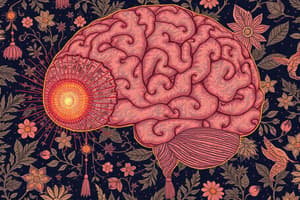Podcast
Questions and Answers
Which symptom is least likely to be associated with neurological disorders?
Which symptom is least likely to be associated with neurological disorders?
Which imaging technique is specifically used to visualize brain activity?
Which imaging technique is specifically used to visualize brain activity?
What is generally considered a primary focus in the treatment of neurological disorders?
What is generally considered a primary focus in the treatment of neurological disorders?
Which factor does NOT directly influence the prognosis of neurological disorders?
Which factor does NOT directly influence the prognosis of neurological disorders?
Signup and view all the answers
What type of testing would likely be utilized to identify genetic disorders?
What type of testing would likely be utilized to identify genetic disorders?
Signup and view all the answers
What common emotional change might occur in individuals with neurological disorders?
What common emotional change might occur in individuals with neurological disorders?
Signup and view all the answers
Which therapeutic approach is aimed at enhancing physical function?
Which therapeutic approach is aimed at enhancing physical function?
Signup and view all the answers
What is a common method for monitoring the progression of neurological disorders?
What is a common method for monitoring the progression of neurological disorders?
Signup and view all the answers
Which type of neurological disorder is characterized by progressive deterioration of the nervous system?
Which type of neurological disorder is characterized by progressive deterioration of the nervous system?
Signup and view all the answers
What distinguishes autoimmune disorders from other types of neurological disorders?
What distinguishes autoimmune disorders from other types of neurological disorders?
Signup and view all the answers
Which condition is a result of an interruption of blood supply to the brain?
Which condition is a result of an interruption of blood supply to the brain?
Signup and view all the answers
Which disorder is primarily characterized by recurrent seizures?
Which disorder is primarily characterized by recurrent seizures?
Signup and view all the answers
Huntington's disease is classified as what type of disorder?
Huntington's disease is classified as what type of disorder?
Signup and view all the answers
Which of the following disorders affects the myelin sheath surrounding nerve fibers?
Which of the following disorders affects the myelin sheath surrounding nerve fibers?
Signup and view all the answers
What is a common symptom associated with neurodegenerative disorders?
What is a common symptom associated with neurodegenerative disorders?
Signup and view all the answers
Which type of neurological disorder is directly related to inherited genetic conditions?
Which type of neurological disorder is directly related to inherited genetic conditions?
Signup and view all the answers
Study Notes
Classification of Neurological Disorders
- Neurological disorders affect the central and peripheral nervous systems, impacting movement, sensation, cognition, and emotion.
- Disorders are categorized by their mechanisms, symptoms, and affected areas.
- Common classifications include:
- Genetic disorders: Inherited conditions affecting neurological development.
- Infections: Neurological infections (viral, bacterial, fungal) damaging the nervous system.
- Degenerative disorders: Progressive nervous system deterioration (e.g., Alzheimer's, Parkinson's).
- Traumatic injuries: Physical damage to the brain or spinal cord (head trauma, spinal cord injury).
- Vascular disorders: Conditions affecting blood flow in the brain (stroke, transient ischemic attacks).
- Autoimmune disorders: Immune system attacking the nervous system (e.g., multiple sclerosis).
- Metabolic disorders: Issues processing substances, impacting the nervous system.
Common Neurological Disorders
- Alzheimer's disease: Progressive neurodegenerative disease affecting memory and cognition.
- Parkinson's disease: Neurodegenerative disorder with motor symptoms (tremors, rigidity, bradykinesia).
- Multiple sclerosis (MS): Autoimmune disease damaging the myelin sheath.
- Stroke: Interrupted blood supply to the brain, leading to cell death.
- Epilepsy: Chronic disorder causing recurrent seizures.
- Huntington's disease: Inherited neurodegenerative disorder leading to movement, cognitive, and psychological problems.
- Amyotrophic Lateral Sclerosis (ALS): Progressive neurodegenerative disease affecting motor neurons.
- Migraines: Severe headaches often with neurological symptoms (auras).
- Tourette syndrome: Neurodevelopmental disorder with involuntary movements and vocalizations (tics).
Symptoms of Neurological Disorders
- Symptoms vary depending on the disorder and affected nervous system area.
- Common symptoms:
- Movement disorders (tremors, rigidity, weakness, incoordination).
- Sensory disturbances (numbness, tingling, pain, vision problems).
- Cognitive impairments (memory loss, confusion, language difficulties).
- Emotional or behavioral changes (depression, anxiety, personality changes).
- Seizures (uncontrolled brain electrical activity).
Diagnostic Techniques
- Neurological assessments involve physical exams, neurological tests, and diagnostic tools.
- Diagnostic approaches include:
- Detailed medical history and neurological examination.
- Imaging tests (MRI, CT scans, PET scans) to visualize the brain and spinal cord.
- Electrophysiological tests (EEG, evoked potentials) measuring brain electrical activity.
- Blood tests to identify infections or metabolic abnormalities.
- Genetic testing for genetic disorders.
Treatment Approaches
- Treatment depends on the specific disorder, progression stage, and patient needs.
- Treatment options:
- Medications to manage symptoms, slow progression, or address underlying causes.
- Therapies (physical, occupational, speech, psychological) to improve patient management.
- Lifestyle modifications (diet, exercise, stress management).
- Surgical interventions for conditions like tumors or vascular abnormalities.
- Complementary therapies to manage symptoms through various techniques.
Prognosis and Management
- Prognosis varies significantly among neurological disorders.
- Influencing prognosis factors include:
- Age of onset.
- Disease severity and progression.
- Individual patient characteristics.
- Access to appropriate medical care.
- Effective management emphasizes:
- Early diagnosis and ongoing monitoring.
- Treatment plans tailored for each individual.
- Supportive systems (patient education, support groups, self-management strategies).
- Regular follow-ups to adjust treatments.
Studying That Suits You
Use AI to generate personalized quizzes and flashcards to suit your learning preferences.
Description
Explore the various classifications of neurological disorders in this quiz. Understand the differences between genetic, infectious, degenerative, traumatic, and vascular disorders. Test your knowledge on how these conditions affect the nervous system and overall health.




